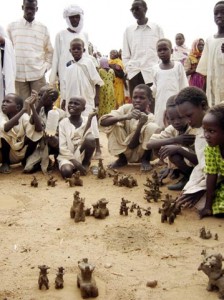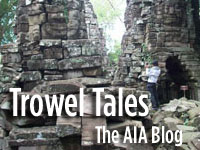The Ancient Search for Peace
by Heather Pringle
December 26, 2008
 Hardly a day seems to go by when I don’t read a news story about a group of desperate migrants risking their lives to flee a war zone in search of more peaceful and prosperous lives. I find it wrenching to read about refugees from Afghanistan cramming into small boats and sailing all the way to Australia in search of security, or the 200,000 people from Darfur who are now crowded into tent camps in Chad. Given a choice, people will vote with their feet every time, abandoning all that is familiar in order to make a better future for kith and kin.
Hardly a day seems to go by when I don’t read a news story about a group of desperate migrants risking their lives to flee a war zone in search of more peaceful and prosperous lives. I find it wrenching to read about refugees from Afghanistan cramming into small boats and sailing all the way to Australia in search of security, or the 200,000 people from Darfur who are now crowded into tent camps in Chad. Given a choice, people will vote with their feet every time, abandoning all that is familiar in order to make a better future for kith and kin.
Two articles I’ve just read on prehistoric migrations shed some fascinating new light on this phenomenon. In the December 18th issue of Nature, two experts on cultural evolution–Peter J. Richerson from the University of California, Davis, and Robert Boyd from the University of California, Los Angeles–write about the powerful effect that migrants have always had on human societies. “People move to societies that provide a more attractive way of life and if all other things being equal, this process spreads ideas and institutions that promote economic efficiency, social order and equality,†note the pair.
In other words, given the slightest opportunity—even a leaky, overcrowded boat in typhoon-ridden seas—people will always try to flee oppressive, impoverished regimes in favor of those that offer a better chance at prosperity, happiness and justice. And as both history and archaeology shows us, this has had a major impact on political landscapes. Empires that offered prosperity, security and rule of law for their citizens, such as the Roman Empire, grew by attracting migrants and assimilating border peoples. These empires were long-lived.  But those that conquered and exploited many of their subjects, such as the Mongol Empire or the old Soviet Union, fell apart relatively quickly. Often their subjects wanted little to do with them: when they saw an opportunity to escape, they packed their bags and headed for the door.  “As long as they vote with their feet and hearts,†write Richerson and Boyd, “immigrants are a more powerful engine for social change than armies.â€Â I find this a very intriguing thought.
And it’s possible that this mechanism could be far older than anyone previously suspected.  In the new issue of Nature Genetics, Harvard Medical School geneticist Alon Keinan and three colleagues have published a study of differences in the human genetic codes found in populations of Africans, Asians and northern Europeans. The team’s ingenious technique—which focused on variations in both the X chromosome and the non-gender chromosomes—allowed them to calculate the sex ratio of the Out-of-Africa migrants. According to the findings, more men than women took part in that early migration, and this evidence, says Keinan, fits with many anthropological studies. In hunter-gatherer societies, long-distance migration tends to be a male affair.
It is certainly possible, as Keinan has suggests, that our ancient male ancestors weren’t above raiding other bands and carrying off a few women along the way as they journeyed to a new land. But I can imagine another possibility. What if our ancient African ancestors were actually the victims of raiding parties in a time of environmental stress, losing some of their precious women? And what if they, like many migrants today, just wanted to find somewhere else to live in peace?  Could that have been an incentive to pull up stakes in Africa and set off to new lands in Asia?Â
Maybe migration is one of the most powerful instincts that we have inherited from our wandering ancestors.
Â
Â
Comments posted here do not represent the views or policies of the Archaeological Institute of America.






 Heather Pringle is a freelance science journalist who has been writing about archaeology for more than 20 years. She is the author of Master Plan: Himmler's Scholars and the Holocaust and The Mummy Congress: Science, Obsession, and the Everlasting Dead. For more about Heather, see our
Heather Pringle is a freelance science journalist who has been writing about archaeology for more than 20 years. She is the author of Master Plan: Himmler's Scholars and the Holocaust and The Mummy Congress: Science, Obsession, and the Everlasting Dead. For more about Heather, see our 



